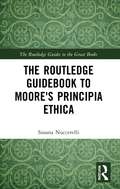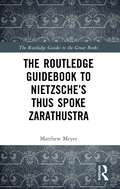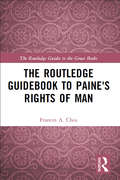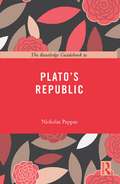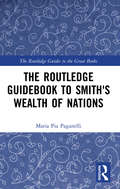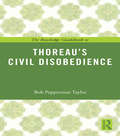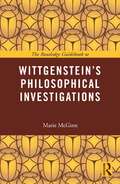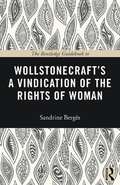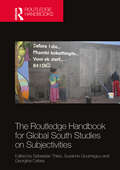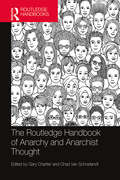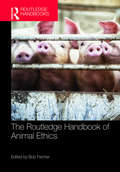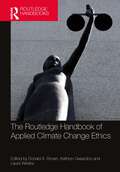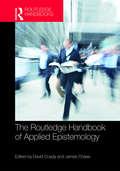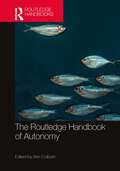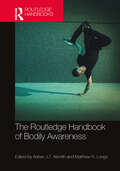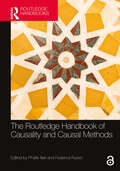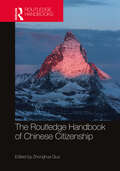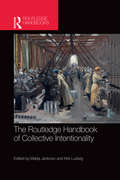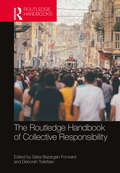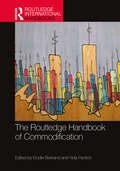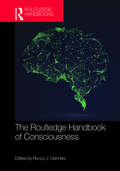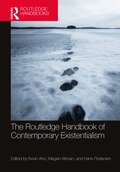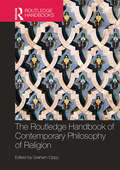- Table View
- List View
The Routledge Guidebook to Moore's Principia Ethica (The Routledge Guides to the Great Books)
by Susana NuccetelliG.E. Moore’s Principia Ethica is a landmark publication in twentieth-century moral philosophy. Through focusing on the origin and evolution of his main doctrines, this guidebook makes it clear that Moore was an innovator whose provocative take on traditional philosophical problems ignited heated debates among philosophers. Principia Ethica is an important text for those attempting to understand and engage with some major philosophical debates in ethics today. The Routledge Guidebook to Moore's Principia Ethica provides a comprehensive introduction to this historic text, examining key Moorean themes including: ethical non-naturalism the naturalistic fallacy the Open Question Argument moral ontology and epistemology ideal utilitarianism vindictive punishment and organicity moral intuition for epistemic justification in ethics theory of value Ideal for anyone wanting to understand and gain perspective on Moore’s seminal work, the book is essential reading for students of moral philosophy, metaethics, normative ethics, philosophical analysis, and related fields.
The Routledge Guidebook to Nietzsche’s Thus Spoke Zarathustra (The Routledge Guides to the Great Books)
by Matthew MeyerThe Routledge Guidebook to Nietzsche’s Thus Spoke Zarathustra is an engaging introduction to this rich and provocative philosophical text. Nietzsche is arguably one of the most influential and yet least understood philosophers of the nineteenth century. The same can be said of his self-proclaimed magnum opus, Thus Spoke Zarathustra. The work has influenced everything from poetry, literature, and music to philosophy, psychoanalysis, and soldiers on the battlefields of World War I. Its contents, however, are still far from being understood. On the one hand, the principal aims and even the genre of Zarathustra remain unclear. On the other hand, the work expresses, in poetic fashion, some of Nietzsche’s most important, controversial, and enigmatic doctrines: the Üebermensch, the eternal recurrence of the same, and the will to power.The Routledge Guidebook to Nietzsche’s Thus Spoke Zarathustra is essential reading for students of nineteenth-century philosophy, German philosophy, and intellectual history and suitable for anyone studying Nietzsche’s most famous text for the first time.
The Routledge Guidebook to Paine's Rights of Man (The Routledge Guides to the Great Books)
by Frances A ChiuUpon publication in 1791-92, the two parts of Thomas Paine’s Rights of Man proved to be both immensely popular and highly controversial. An immediate bestseller, it not only defended the French revolution but also challenged current laws, customs, and government. The Routledge Guidebook to Paine’s Rights of Man provides the first comprehensive and fully contextualized introduction to this foundational text in the history of modern political thought, addressing its central themes, reception, and influence. The Guidebook examines: the history of rights, populism, representative governments, and challenges to monarchy from the 12th through 18th century; Paine’s arguments against monarchies, mixed governments, war, and state-church establishments; Paine’s views on constitutions; Paine’s proposals regarding suffrage, inequality, poverty, and public welfare; Paine’s revolution in rhetoric and style; the critical reception upon publication and influence through the centuries, as well as Paine’s relevance today. The Routledge Guidebook to Paine’s Rights of Man is essential reading for students of eighteenth-century American and British history, politics and philosophy, and anyone approaching Paine’s work for the first time.
The Routledge Guidebook to Plato's Republic (The Routledge Guides to the Great Books)
by Nickolas PappasPlato, often cited as a founding father of Western philosophy, set out ideas in the Republic regarding the nature of justice, order, and the character of the just individual, that endure into the modern day. The Routledge Guidebook to Plato’s Republic introduces the major themes in Plato’s great book and acts as a companion for reading the work, examining: The context of Plato’s work and the background to his writing Each separate part of the text in relation to its goals, meanings and impact The reception the book received when first seen by the world The relevance of Plato’s work to modern philosophy, its legacy and influence. With further reading included throughout, this text follows Plato’s original work closely, making it essential reading for all students of philosophy, and all those wishing to get to grips with this classic work.
The Routledge Guidebook to Smith's Wealth of Nations (The Routledge Guides to the Great Books)
by Maria Pia PaganelliAdam Smith (1723–1790) is famous around the world as the founding father of economics, and his ideas are regularly quoted and invoked by politicians, business leaders, economists, and philosophers. However, considering his fame, few people have actually read the whole of his magnum opus The Wealth of Nations – the first book to describe and lay out many of the concepts that are crucial to modern economic thinking. The Routledge Guidebook to Smith’s Wealth of Nations provides an accessible, clear, and concise introduction to the arguments of this most notorious and influential of economic texts. The Guidebook examines: the historical context of Smith’s though and the background to this seminal work the key arguments and ideas developed throughout The Wealth of Nations the enduring legacy of Smith’s work The Routledge Guidebook to Smith’s Wealth of Nations is essential reading for students of philosophy, economics, politics, and sociology who are approaching Smith’s work for the first time.
The Routledge Guidebook to Thoreau's Civil Disobedience (The Routledge Guides to the Great Books)
by Bob Pepperman TaylorSince its publication in 1849, Henry David Thoreau’s Civil Disobedience has influenced protestors, activists and political thinkers all over the world. Including the full text of Thoreau’s essay, The Routledge Guidebook to Thoreau’s Civil Disobedience explores the context of his writing, analyses different interpretations of the text and considers how posthumous edits to Civil Disobedience have altered its intended meaning. It introduces the reader to: the context of Thoreau’s work and the background to his writing the significance of the references and allusions the contemporary reception of Thoreau’s essay the ongoing relevance of the work and a discussion of different perspectives on the work. Providing a detailed analysis which closely examines Thoreau’s original work, this is an essential introduction for students of politics, philosophy and history, and all those seeking a full appreciation of this classic work.
The Routledge Guidebook to Wittgenstein's Philosophical Investigations (The Routledge Guides to the Great Books)
by Marie McGinnWittgenstein is one of the most important and influential twentieth-century philosophers in the western tradition. In his Philosophical Investigations he undertakes a radical critique of analytical philosophy's approach to both the philosophy of language and the philosophy of mind. The Routledge Guidebook to Wittgenstein's Philosophical Investigations introduces and assesses: Wittgenstein's life The principal ideas of the Philosophical Investigations Some of the principal disputes concerning the interpretation of his work Wittgenstein's philosophical method and its connection with the form of the text. With further reading included throughout, this guidebook is essential reading for all students of philosophy, and all those wishing to get to grips with this masterpiece.
The Routledge Guidebook to Wollstonecraft's A Vindication of the Rights of Woman (The Routledge Guides to the Great Books)
by Sandrine BergesMary Wollstonecraft was one of the greatest philosophers and writers of the Eighteenth century. During her brief career, she wrote novels, treatises, a travel narrative, a history of the French Revolution, a conduct book, and a children's book. Her most celebrated and widely-read work is A Vindication of the Rights of Woman. This Guidebook introduces: Wollstonecraft’s life and the background to A Vindication of the Rights of Woman The ideas and text of A Vindication of the Rights of Woman Wollstonecraft’s enduring influence in philosophy and our contemporary intellectual life It is ideal for anyone coming to Wollstonecraft’s classic text for the first time and anyone interested in the origins of feminist thought.
The Routledge Handbook for Global South Studies on Subjectivities (Transdisciplinary Souths)
by Sebastian Thies Susanne Goumegou Georgina CebeyThe Routledge Handbook for Global South Studies on Subjectivities provides a series of exemplary studies conjoining perspectives from Asian, African, and Latin American Studies on subjectivity in the Global South as a central category of social and cultural analysis. The contestation of the Northern myth of the autonomous subject—the dispositive that contests subject formation in the South by describing it as fragmented, incomplete, delayed or simply deviant, has been a cornerstone of theory production from the South over the years.This volume’s contributions offer an interdisciplinary and transarea dialogue, reframing issues of selfhood and alterity, of personhood, of the human, of the commons and contesting the North’s presumption in determining what kind of subjectivities abide by its norms, whose voices are heard, who is recognised as a subject, and, by extension, whose lives matter. In the context of the shifting dynamics of today’s manifold crises, they raise questions regarding how subjectivities act on or resist such forms of contestation, contingency, and indeterminacy.A major contribution to the growing body of scholarship on the Global South, this handbook will be an essential resource for students, scholars, researchers and instructors in literature, media and culture studies, sociology, anthropology, philosophy, law, politics, visual arts and art history.
The Routledge Handbook of Anarchy and Anarchist Thought (Routledge Handbooks in Philosophy)
by Gary ChartierThis Handbook offers an authoritative, up-to-date introduction to the rich scholarly conversation about anarchy—about the possibility, dynamics, and appeal of social order without the state. Drawing on resources from philosophy, economics, law, history, politics, and religious studies, it is designed to deepen understanding of anarchy and the development of anarchist ideas at a time when those ideas have attracted increasing attention. The popular identification of anarchy with chaos makes sophisticated interpretations—which recognize anarchy as a kind of social order rather than an alternative to it—especially interesting. Strong, centralized governments have struggled to quell popular frustration even as doubts have continued to percolate about their legitimacy and long-term financial stability. Since the emergence of the modern state, concerns like these have driven scholars to wonder whether societies could flourish while abandoning monopolistic governance entirely. Standard treatments of political philosophy frequently assume the justifiability and desirability of states, focusing on such questions as, What is the best kind of state? and What laws and policies should states adopt?, without considering whether it is just or prudent for states to do anything at all. This Handbook encourages engagement with a provocative alternative that casts more conventional views in stark relief. Its 30 chapters, written specifically for this volume by an international team of leading scholars, are organized into four main parts: I. Concept and SignificanceII. Figures and TraditionsIII. Legitimacy and OrderIV. Critique and Alternatives In addition, a comprehensive index makes the volume easy to navigate and an annotated bibliography points readers to the most promising avenues of future research.
The Routledge Handbook of Animal Ethics (Routledge Handbooks in Applied Ethics)
by Bob FischerThere isn’t one conversation about animal ethics. Instead, there are several important ones that are scattered across many disciplines.This volume both surveys the field of animal ethics and draws professional philosophers, graduate students, and undergraduates more deeply into the discussions that are happening outside of philosophy departments. To that end, the volume contains more nonphilosophers than philosophers, explicitly inviting scholars from other fields—such as animal science, ecology, economics, psychology, law, environmental science, and applied biology, among others—to bring their own disciplinary resources to bear on matters that affect animals. The Routledge Handbook of Animal Ethics is composed of 44 chapters, all appearing in print here for the first time, and organized into the following six sections: I. Thinking About Animals II. Animal Agriculture and Hunting III. Animal Research and Genetic Engineering IV. Companion Animals V. Wild Animals: Conservation, Management, and Ethics VI. Animal Activism The chapters are brief, and they have been written in a way that is accessible to serious undergraduate students, regardless of their field of study. The volume covers everything from animal cognition to the state of current fisheries, from genetic modification to intersection animal activism. It is a resource designed for anyone interested in the moral issues that emerge from human interactions with animals.
The Routledge Handbook of Applied Climate Change Ethics (Routledge Handbooks in Applied Ethics)
by Laura Westra Donald A. Brown Kathryn GwiazdonThe Routledge Handbook of Applied Climate Change Ethics is a powerful reference source for the identification and exploration of the underlying ethical issues in climate change law and policy. Bridging theory with practice, it takes ethical engagement out of the classroom and into the halls of governance. The Handbook‘s 39 chapters--written by a diverse and inter-disciplinary team of experts from around the world--are case studies divided into five parts. Parts I-IV highlight the ethical issues that arise in climate change policy formation, from duties not to harm to duties to consider the views and voices of those who will be, or are being, harmed; from the role of human rights, justice, and democracy to how to identify and respond to disinformation and denialism. It also raises the ethics of various policy responses, such as cap-and-trade, carbon taxing, and geo-engineering. Part V offers a way forward, with strategies on how to expressly consider ethics in climate change policy formation, from negotiations to education, media, communication, and the power and potential of shaming. The volume is essential reading for students, professors, and practitioners who wish to better engage with government and non-government organizations on climate policy, to better understand the practical application of the theory and philosophy of ethics, and how to more strongly draft and defend ethical action in negotiating, drafting, and defending climate change law and policy.
The Routledge Handbook of Applied Epistemology (Routledge Handbooks in Philosophy)
by James Chase David CoadyWhile applied epistemology has been neglected for much of the twentieth century, it has seen emerging interest in recent years, with key thinkers in the field helping to put it on the philosophical map. Although it is an old tradition, current technological and social developments have dramatically changed both the questions it faces and the methodology required to answer those questions. Recent developments also make it a particularly important and exciting area for research and teaching in the twenty-first century. The Routledge Handbook of Applied Epistemology is an outstanding reference source to this exciting subject and the first collection of its kind. Comprising entries by a team of international contributors, the Handbook is divided into six main parts: The Internet Politics Science Epistemic institutions Individual investigators Theory and practice in philosophy. Within these sections, the core topics and debates are presented, analyzed, and set into broader historical and disciplinary contexts. The central topics covered include: the prehistory of applied epistemology, expertise and scientific authority, epistemic aspects of political and social philosophy, epistemology and the law, and epistemology and medicine. Essential reading for students and researchers in epistemology, political philosophy, and applied ethics the Handbook will also be very useful for those in related fields, such as law, sociology, and politics.
The Routledge Handbook of Autonomy (Routledge Handbooks in Philosophy)
by Ben ColburnThe question of autonomy is fundamental to understanding some of the most important questions and debates in contemporary political and moral life, from freedom of the individual, free will and decision-making to controversies surrounding medical ethics, human rights and the justifications for state intervention. It is also a crucial concept for understanding the development of liberalism. The Routledge Handbook of Autonomy is a comprehensive survey and assessment of the key figures, debates and problems surrounding autonomy. Comprising over forty chapters by an international team of contributors, the Handbook is divided into five clear parts: Autonomy through History Foundations of Autonomy Threats to Autonomy The Significance of Autonomy Autonomy in Application. Within these sections, all the essential topics are addressed, making The Routledge Handbook of Autonomy an outstanding reference source for those in political philosophy, ethics, applied ethics and philosophy of law. It is also highly recommended reading for those in related subjects, such as politics, social policy and education.
The Routledge Handbook of Bodily Awareness (Routledge Handbooks in Philosophy)
by Matthew R. Longo Alsmith, Adrian J.TBodily awareness is one of the most interesting and enigmatic forms of experience. Our earliest and most pervasive form of conscious experience, it also arguably remains the most private. Bodily awareness has also long played a central role in the study of the mind and self-consciousness, and is fundamental to much current philosophical and psychological research. The Routledge Handbook of Bodily Awareness is an outstanding reference source to this fascinating subject. Comprising over thirty chapters by an international team of contributors, the Handbook is divided into seven parts: Epistemology and Metaphysics Historical Issues Body Representation Sensing the Body Dynamics Pathology Interaction. Within these sections specific topics covered include bodily ownership, personal identity, self-consciousness, body modelling in robot design, body illusions, touch, proprioception, phantom limb syndrome, pain, eating disorders, out-of-body experiences and virtual reality. The handbook features specially commissioned contributions from researchers in a wide array of disciplines, whilst being accessible to readers with any disciplinary background. It also includes an interdisciplinary introduction, written by the editors, tying together the central themes with particular attention to the interaction between conceptual, technological and empirical issues. The Routledge Handbook of Bodily Awareness will be of great interest to those in a wide variety of philosophical subdisciplines as well as those in psychology, cognitive science, sociology and related subjects.
The Routledge Handbook of Causality and Causal Methods (Routledge Handbooks in Philosophy)
by Phyllis Illari Federica RussoThe Routledge Handbook of Causality and Causal Methods adopts a pluralistic, interdisciplinary approach to causality. It formulates distinct questions and problems of causality as they arise across scientific and policy fields. Exploring, in a comparative way, how these questions and problems are addressed in different areas, the Handbook fosters dialogue and exchange. It emphasizes the role of the researchers and the normative considerations that arise in the development of methodological and empirical approaches. The Handbook includes authors from all over the world and with many different disciplinary backgrounds, and its 50 chapters appear in print here for the first time. The chapters are organized into the following seven parts: Causal Pluralism from Theory to Practice Causal Theory and the Role of Researchers Features of Causal Systems Causal Methods, Experimentation and Observation Measurement and Data Causality, Knowledge, and Action Causal Theory across Disciplinary Borders Essential reading for scholars interested in an interdisciplinary approach to causality and causal methods, the volume is also a valuable resource for advanced undergraduates as well as for graduate students interested in delving into the rich field of causality.Chapters 15 and 36 of this book are freely available as downloadable Open Access PDFs at http://www.taylorfrancis.com under a Creative Commons [Attribution-Non Commercial-No Derivatives (CC-BY-NC-ND)] 4.0 license.
The Routledge Handbook of Chinese Citizenship (China Perspectives)
by Zhonghua GuoTwo assumptions prevail in the study of Chinese citizenship: one holds that citizenship is unique to the Western political culture, and China has historically lacked the necessary conditions for its development; the other implies that China is an authoritarian regime that has always been subject to autocratic power, in which citizens and citizenship play a limited role. This volume negates both assumptions. On the one hand, it shows that China has its own unique and rich experiences of the emergence, development, rights, obligations, acts, culture, education, and sites of citizenship, indicating the need to widen the scope of citizenship studies to include non-Western societies. On the other hand, it aims to show that citizenship has been a core issue running through China's political development since the modern period, urging scholars to bring ‘citizenship’ into consideration in the study of Chinese politics. This Handbook sets a new agenda for citizenship studies and Chinese politics. Its clear, accessible style makes it essential reading for students and scholars interested in citizenship and China studies.
The Routledge Handbook of Collective Intentionality (Routledge Handbooks in Philosophy)
by Kirk Ludwig Marija JankovicThe Routledge Handbook of Collective Intentionality provides a wide-ranging survey of topics in a rapidly expanding area of interdisciplinary research. It consists of 36 chapters, written exclusively for this volume, by an international team of experts. What is distinctive about the study of collective intentionality within the broader study of social interactions and structures is its focus on the conceptual and psychological features of joint or shared actions and attitudes, and their implications for the nature of social groups and their functioning. This Handbook fully captures this distinctive nature of the field and how it subsumes the study of collective action, responsibility, reasoning, thought, intention, emotion, phenomenology, decision-making, knowledge, trust, rationality, cooperation, competition, and related issues, as well as how these underpin social practices, organizations, conventions, institutions and social ontology. Like the field, the Handbook is interdisciplinary, drawing on research in philosophy, cognitive science, linguistics, legal theory, anthropology, sociology, computer science, psychology, economics, and political science. Finally, the Handbook promotes several specific goals: (1) it provides an important resource for students and researchers interested in collective intentionality; (2) it integrates work across disciplines and areas of research as it helps to define the shape and scope of an emerging area of research; (3) it advances the study of collective intentionality.
The Routledge Handbook of Collective Intentionality (Routledge Handbooks in Philosophy)
by Kirk Ludwig Marija JankovicThe Routledge Handbook of Collective Intentionality provides a wide-ranging survey of topics in a rapidly expanding area of interdisciplinary research. It consists of 36 chapters, written exclusively for this volume, by an international team of experts. What is distinctive about the study of collective intentionality within the broader study of social interactions and structures is its focus on the conceptual and psychological features of joint or shared actions and attitudes, and their implications for the nature of social groups and their functioning. This Handbook fully captures this distinctive nature of the field and how it subsumes the study of collective action, responsibility, reasoning, thought, intention, emotion, phenomenology, decision-making, knowledge, trust, rationality, cooperation, competition, and related issues, as well as how these underpin social practices, organizations, conventions, institutions and social ontology. Like the field, the Handbook is interdisciplinary, drawing on research in philosophy, cognitive science, linguistics, legal theory, anthropology, sociology, computer science, psychology, economics, and political science. Finally, the Handbook promotes several specific goals: (1) it provides an important resource for students and researchers interested in collective intentionality; (2) it integrates work across disciplines and areas of research as it helps to define the shape and scope of an emerging area of research; (3) it advances the study of collective intentionality.
The Routledge Handbook of Collective Responsibility (Routledge Handbooks in Philosophy)
by Deborah Bazargan-Forward Saba TollefsenThe Routledge Handbook of Collective Responsibility comprehensively addresses questions about who is responsible and how blame or praise should be attributed when human agents act together. Such questions include: Do individuals share responsibility for the outcome or are individuals responsible only for their contribution to the act? Are individuals responsible for actions done by their group even when they don’t contribute to the outcome? Can a corporation or institution be held morally responsible apart from the responsibility of its members? The Handbook’s 35 chapters—all appearing here for the first time and written by an international team of experts—are organized into four parts: Part I: Foundations of Collective Responsibility Part II: Theoretical Issues in Collective Responsibility Part III: Domains of Collective Responsibility Part IV: Applied Issues in Collective Responsibility Each part begins with a short introduction that provides an overview of issues and debates within that area and a brief summary of its chapters. In addition, a comprehensive index allows readers to better navigate the entirety of the volume’s contents. The result is the first major work in the field that serves as an instructional aid for those in advanced undergraduate courses and graduate seminars, as well as a reference for scholars interested in learning more about collective responsibility.
The Routledge Handbook of Collective Responsibility (Routledge Handbooks in Philosophy)
by Bazargan-Forward, Saba / Tollefsen, DeborahThe Routledge Handbook of Collective Responsibility comprehensively addresses questions about who is responsible and how blame or praise should be attributed when human agents act together. Such questions include: Do individuals share responsibility for the outcome or are individuals responsible only for their contribution to the act? Are individuals responsible for actions done by their group even when they don’t contribute to the outcome? Can a corporation or institution be held morally responsible apart from the responsibility of its members? The Handbook’s 35 chapters—all appearing here for the first time and written by an international team of experts—are organized into four parts:Part I: Foundations of Collective ResponsibilityPart II: Theoretical Issues in Collective ResponsibilityPart III: Domains of Collective ResponsibilityPart IV: Applied Issues in Collective ResponsibilityEach part begins with a short introduction that provides an overview of issues and debates within that area and a brief summary of its chapters. In addition, a comprehensive index allows readers to better navigate the entirety of the volume’s contents. The result is the first major work in the field that serves as an instructional aid for those in advanced undergraduate courses and graduate seminars, as well as a reference for scholars interested in learning more about collective responsibility.
The Routledge Handbook of Commodification (Routledge International Handbooks)
by Bertrand ElodieSome goods are freely traded as commodities without question or controversy. For other goods, their commodification – their being made available in exchange for money, or their being subject to market valuation and exchange – is hotly contested. “Contested” commodities range from labour and land, to votes, healthcare, and education, to human organs, gametes, and intimate services, to parks and emissions. But in the context of a market economy, what distinguishes these goods as non-commodifiable, or what defines them as contestable commodities? And why should their status as such justify restricting the market choices of rationally consenting parties to otherwise voluntary exchanges? This volume draws together wide-ranging, interdisciplinary research on the legitimate scope of markets and the kinds of goods that should be exempt therefrom. In bringing diverse answers to this question together for the first time, it finally identifies commodification studies as a unique field of scholarly research in its own right. In so doing, it fosters interdisciplinary dialogue, advances scholarship, and enhances education in this controversial, important, and growing field of research. Contemporary theorists who examine this question do so from across the disciplinary spectrum and ground their answers in diverse scholarly literature and divergent methodological approaches. Their arguments will be of interest to scholars and students of philosophy, economics, law, political science, sociology, policy, feminist theory, and ecology, among others. The contributors to this volume take diverse and divergent positions on the benefits of markets in general and on the possible harms of specific contested markets in particular. While some favour free markets and others regulation or prohibition, and while some engage in more normative and others in more empirical analysis, the contributors all advance nuanced and thoughtful arguments that engage deeply with the complex set of moral and empirical questions at the heart of commodification studies. This volume collects their new and provocative work together for the first time.
The Routledge Handbook of Consciousness (Routledge Handbooks in Philosophy)
by Rocco J. GennaroThere has been an explosion of work on consciousness in the last 30–40 years from philosophers, psychologists, and neurologists. Thus, there is a need for an interdisciplinary, comprehensive volume in the field that brings together contributions from a wide range of experts on fundamental and cutting-edge topics. The Routledge Handbook of Consciousness fills this need and makes each chapter’s importance understandable to students and researchers from a variety of backgrounds. Designed to complement and better explain primary sources, this volume is a valuable "first-stop" publication for undergraduate or graduate students enrolled in any course on "Consciousness," "Philosophy of Mind," or "Philosophy of Psychology," as well as a valuable handbook for researchers in these fields who want a useful reference to have close at hand. The 34 chapters, all published here for the first time, are divided into three parts: Part I covers the "History and Background Metaphysics" of consciousness, such as dualism, materialism, free will, and personal identity, and includes a chapter on Indian philosophy. Part II is on specific "Contemporary Theories of Consciousness," with chapters on representational, information integration, global workspace, attention-based, and quantum theories. Part III is entitled "Major Topics in Consciousness Research," with chapters on psychopathologies, dreaming, meditation, time, action, emotion, multisensory experience, animal and robot consciousness, and the unity of consciousness. Each chapter begins with a brief introduction and concludes with a list of "Related Topics," as well as a list of "References," making the volume indispensable for the newcomer and experienced researcher alike.
The Routledge Handbook of Contemporary Existentialism (Routledge Handbooks in Philosophy)
by Kevin Aho Hans Pedersen Megan AltmanOf the philosophical movements of the twentieth century existentialism is one of the most powerful and thought-provoking. Its engagement with the themes of authenticity, freedom, bad faith, nihilism, and the death of God captured the imagination of millions. However, in the twenty-first century existentialism is grappling with fresh questions and debates that move far beyond traditional existential preoccupations, ranging from the lived experience of the embodied self, intersectionality, and feminist theory to comparative philosophy, digital existentialism, disability studies, and philosophy of race.The Routledge Handbook of Contemporary Existentialism explores these topics and more, connecting the ideas and insights of existentialism with some of the most urgent debates and challenges in philosophy today. Eight clear sections explore the following topics: methodology and technology social and political perspectives environment and place affectivity and emotion death and freedom value existentialism and Asian philosophy aging and disability. As well as chapters on key figures such as Kierkegaard, Nietzsche, Heidegger, Sartre, and Beauvoir, the Handbook includes chapters on topics as diverse as Chicana feminism, ecophilosophy and the environment, Latina existentialism, Black nihilism, the Kyoto school and southeast Asian existentialism, and the experiences of aging, disability, and death.Essential reading for students and researchers in the areas of existentialism and phenomenology, The Routledge Handbook of Contemporary Existentialism will also be of interest to those studying ethics, philosophy and gender, philosophy of race, the emotions and philosophical issues in health and illness as well as related disciplines such as Literature, Sociology, and Political Theory.
The Routledge Handbook of Contemporary Philosophy of Religion (Routledge Handbooks in Philosophy)
by Graham OppyPhilosophy of religion has experienced a renaissance in recent times, paralleling the resurgence in public debate about the place and value of religion in contemporary Western societies. The Routledge Handbook of Contemporary Philosophy of Religion is an outstanding reference source to the key topics, problems and debates in this exciting subject. Comprising over thirty chapters by a team of international contributors, the Handbook is divided into seven parts: theoretical orientations conceptions of divinity epistemology of religious belief metaphysics and religious language religion and politics religion and ethics religion and scientific scrutiny. Within these sections central issues, debates and problems are examined, including: religious experience, religion and superstition, realism and anti-realism, scientific interpretation of religious texts, feminist approaches to religion, religion in the public square, tolerance, religion and meta-ethics, religion and cognitive science, and the meaning of life. Together, they offer readers an informed understanding of the current state of play in the liveliest areas of contemporary philosophy of religion. The Routledge Handbook of Contemporary Philosophy of Religion is essential reading for students and researchers of philosophy of religion from across the Humanities and Social Sciences.
